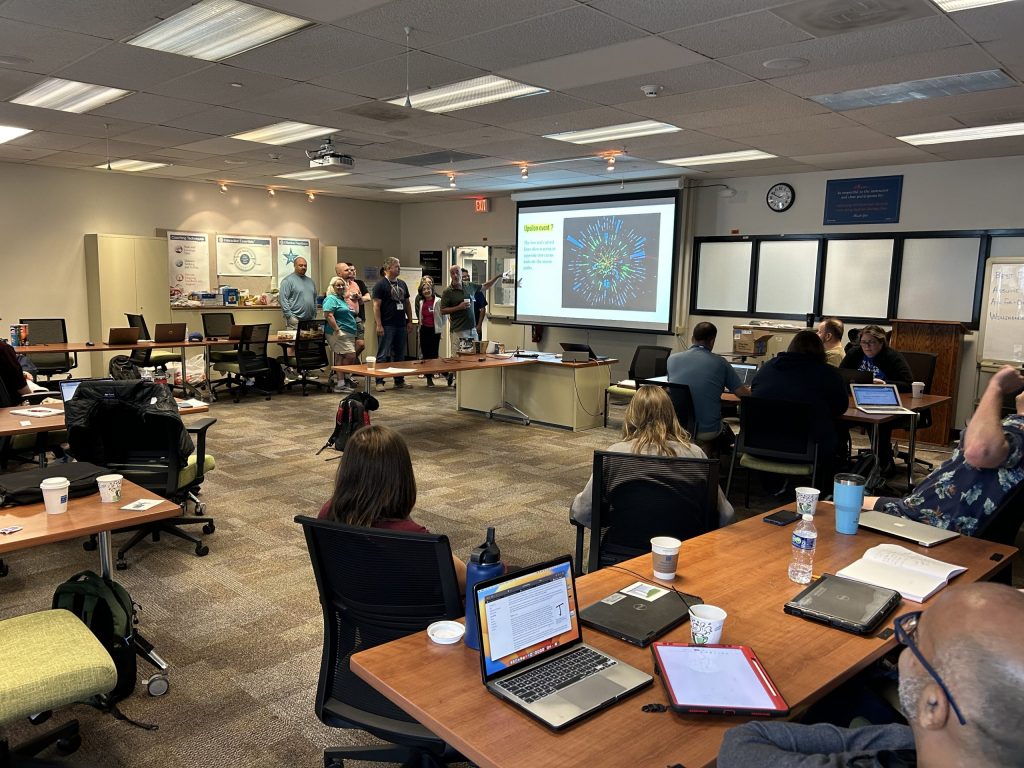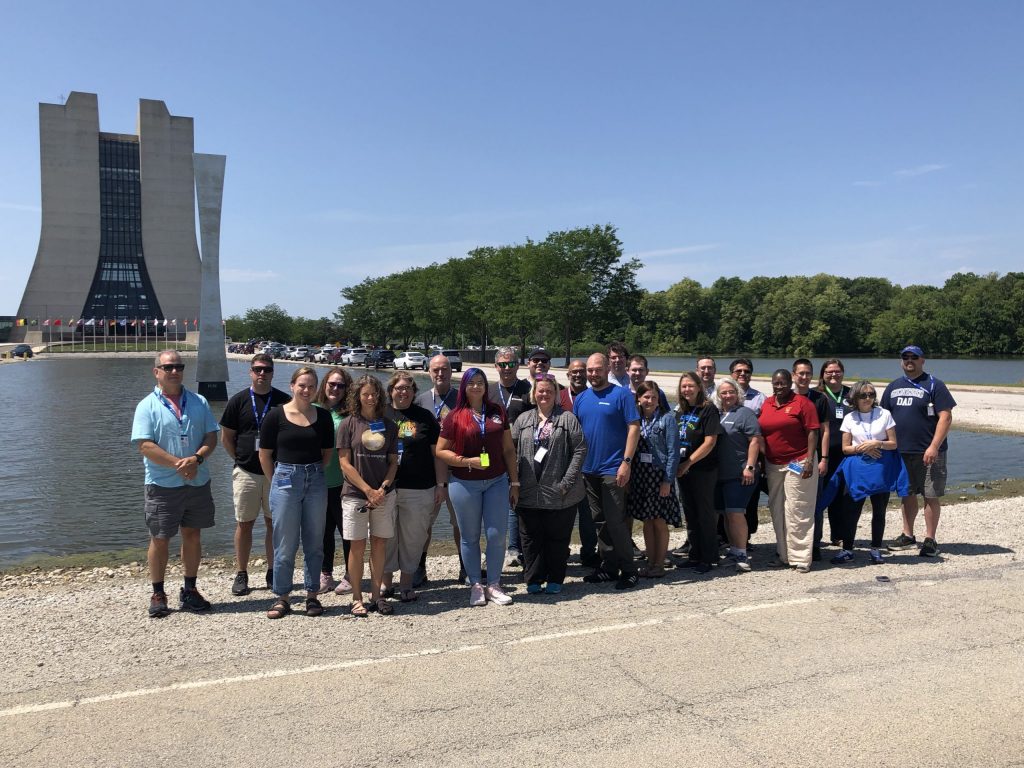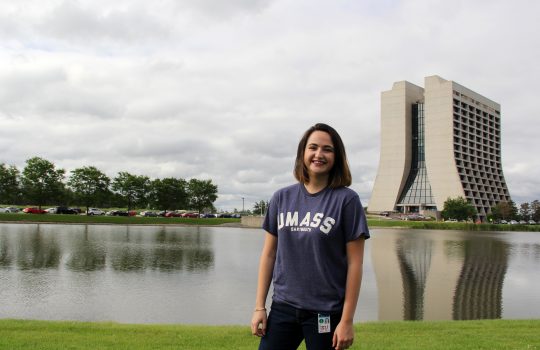Editor’s note: Fermilab offers a wide range of STEM educational programs. This article is the first in a multi-part series that highlights some of the opportunities available at the lab.
For the first half of a weeklong workshop at the U.S. Department of Energy’s Fermi National Accelerator Laboratory, a select group of high school teachers put on their “student hats” and learned how to use real-world scenarios to expose their students to particle physics.
They did so at the QuarkNet Data Camp. QuarkNet is a nationally acclaimed science education program, funded by the National Science Foundation and coordinated by the University of Notre Dame. Fermilab, a major contributor to the QuarkNet program since its inception, hosted the program’s annual Data Camp in July.
The camp lasts for a week and draws about two dozen high school teachers, predominantly physics teachers, from across the country. Other high school teachers who are teaching and learning fellows for QuarkNet run the Data Camp and instruct the participants. In addition to the main activities, the teachers participating in the workshop get to see Fermilab and learn from scientists.
For the first few days at the workshop, the teachers worked together in groups to analyze real particle collision data from the Compact Muon Solenoid detector at the Large Hadron Collider. The teachers must use the data — cleaned up a bit to make it easier to use — to figure out particle masses and look for a particular kind of particle collision event. Particles created in the collision decay into other particles, and by finding those post-decay particles, the teachers can infer what kind of event they are seeing.
“They were students for the first part of the week,” said Jodi Hansen, a high school physics teacher from Minnesota and a teaching and learning fellow for QuarkNet who has helped facilitate the program for more than a decade. “We pushed them; sometimes they were uncomfortable, and sometimes they were doing things that were hard for them. A lot of them hadn’t done physics like this before, and this is what physicists who work on the LHC do all the time.”

A group of teachers participating in the QuarkNet Data Camp presents what they have learned from their data set over the past few days. Photo: Spencer Pasero, Fermilab
Spencer Pasero, a member of Fermilab’s Office of Education and Public Engagement, said giving the teachers real datasets that physicists have used provides a more authentic experience, and it teaches them that real data can be messy and ambiguous. One challenge for the teachers is picking out signals, or useful information, from the background noise that clouds real-world data.
“You have to explore and figure out, ‘what’s this really telling me?’” he said. “Are there things that I might be assuming that are not accurate? How do you tell signal and background apart? In a lot of high school labs, there is no background, it’s all signal, and so being able to tease those things apart is useful.”
Putting the teachers into the position of student and asking them to solve problems can be daunting, said Jeremy Smith, Baltimore physics teacher and a teaching and learning fellow for QuarkNet who helps facilitate the data camp. But he and Pasero both said the process is rewarding and leaves the teachers eager to share what they have learned with their students.
“It can be really helpful to experience new topics, new content, new ways of thinking and working, from that student perspective,” Pasero said. “It helps them get into that mindset of, now that I’ve experienced this, and I know what I needed to learn to be able to understand this data, how am I going to give that to my students?”
Emily Rosen, a teacher from Cincinnati and a participant in this year’s data camp, has been teaching for 18 years and has been involved with QuarkNet since the beginning of her career.
For Rosen, analyzing the data challenged her in a way that teaching cannot. The experience gave her an opportunity to solve a complex physics problem and reminded her of what it’s like to be a student.
“As teachers of a subject that is sometimes intimidating and complex, it’s really good to be reminded that the first time a student sees something, it’s not as straightforward as it appears to me,” Rosen said. “It’s just nice to be academically challenged and to remind myself what that feels like, and what working with other people feels like when I’m feeling challenged.”
As the groups of teachers finished their project, they could then collaborate with and learn from other groups that were looking for particles with similar decay products. This collaboration helped the groups of teachers put together unique presentations that focus on the differences between the different groups’ tasks, Hansen said.
“They share with other teachers studying the same decay channel to see what their particle did to make those electrons, or to make those muons, that’s different with different particles,” she said. “We had them look for what was similar and what was different. When they got back together with their particle group, we asked them to point out things that were different from the other particles.”

This year’s QuarkNet Data Camp attendees stand before the reflecting pool in front of Fermilab’s Wilson Hall. Photo: Spencer Pasero, Fermilab
After the teachers gave presentations about what they learned, they spent the last couple of days discussing ways to use this experience to bring particle physics into their curriculum. In addition to the data camp, QuarkNet provides a vast library of data activities, covering different aspects of particle physics that teachers can integrate into their classrooms.
“For the second half of the workshop, they put their teacher hat back on and focus on thinking about ways that they can implement what they’ve learned into their curriculum,” Smith said.
“Teachers say they don’t have enough time to teach the stuff they already have to, to say nothing of an entire new unit,” he continued. “Rather, the teachers find it helpful to sprinkle these activities throughout the curriculum and do it as an addition to or replacement for something that they already have. They’re weaving particle physics concepts into the whole course.”
Hugo Delgado, a physics teacher from Puerto Rico, said he learned not only about particle physics and Fermilab, but also how fellow teachers use particle physics to construct a diverse and engaging physics curriculum.
Delgado usually works with other science teachers and doesn’t have many opportunities to meet fellow high school physics teachers. During the QuarkNet Data Camp, he got the chance to learn from peers.
“Learning that the difficulties I have as a teacher in Puerto Rico are similar to the ones that people from other places in the United States have, that gave me hope that I was doing things right,” Delgado said. “Also, they gave me ideas for how I can approach particle physics in my classroom.”
Discussing opportunities to bring particle physics into the classroom with other teachers was also inspiring to Rosen.
“Teaching science is like shooting a moving target — because if you’re doing it well, it’s changing — and we should keep up with it and bring it into our curriculum,” she said. “I am deeply appreciative of experiences where I can grow myself so that I can bring that back into my classes.”
QuarkNet Data Camp takes place each July. Teachers who are members of QuarkNet can be nominated by their mentor or QuarkNet staff to participate in the annual camp. There is no cost to attend – all expenses are paid – and the educators receive a stipend for their time.
“Even though it was just one week, I think it has been the highlight of the whole summer,” Delgado said. “I have already started to plan my year, and it’s going to have a great impact on how I approach my class this year.”
Fermi National Accelerator Laboratory is supported by the Office of Science of the U.S. Department of Energy. The Office of Science is the single largest supporter of basic research in the physical sciences in the United States and is working to address some of the most pressing challenges of our time. For more information, please visit science.energy.gov.



